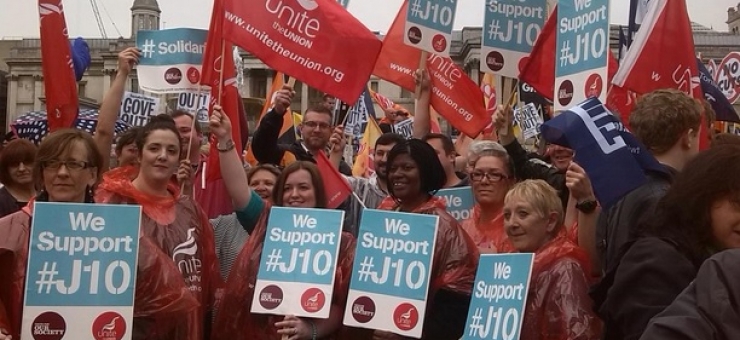News
Hundreds of thousands turnout for UK public sector protests

Up to a million public sector workers in the United Kingdom turned out for a day of action over pay freezes, falling living standards and pensions.
The industrial action – Britain’s largest for three years – has seen teachers, firefighters, care workers, refuse collectors, librarians and other civil servants man the picket lines across the country.
UNI General Secretary Philip Jennings said, "7 years on from the financial crash and 4 years into hard nosed austerity policies the British public are now seeing the harsh realities as their public services deteriorate. The public is picking up the tab three times: through the bailout, wage decline and collapsing public services.
"Meanwhile, CEO pay rose 15% this last year and now averages £4.2 million. The average CEO earns the British average wage of £26,000 in just two days. It's 'alright for some' in Cameron's Britain:"
The Conservative-led government’s devastating pay freeze has seen pay across most of the public sector increase by just 3% since the Coalition came to power in 2010.
Pay freezes in 2010, 2011 and 2012 and a punitive 1% pay cap ever since has sent the pay packets of local government and school workers plummeting back to the level of the 1990s, according to the TUC.
UNISON General Secretary Dave Prentis said, “The continuing pay freeze is damaging staff morale and service quality across the public sector, and today our members in local government and schools are saying enough is enough. By starving local councils of the finance they need to deliver vital public services and pay staff a fair wage, the Government is missing an opportunity to not only inject money into the economy but to create much needed full-time jobs."
“This year’s pay offer would result in a cumulative real-term cut of almost 20%. We are now in a position where an estimated 470,000 local government and school workers are paid less than the LIVING Wage, and one million earn less than the Coalition’s low-pay threshold of £21,000. That’s £6000 less than average UK earnings.”
Earlier this week, the TUC published research showing that since the coalition took office, local government workers, NHS staff, teachers, firefighters, civil servants and other public servants were on average £2,245 worse off in real terms.
In a message to workers across the public sector on strike TUC General Secretary Frances O’Grady said:
“Across the public sector workers are on strike today to say enough is enough. Year after year pay has failed to keep up with the cost of living. Public sector workers are on average more than £2,000 worse off under this government.
“Nearly half a million local government workers earn less than the living wage. But even as the economy starts to grow, ministers have told them that the pay cap will last until at least 2018.
“This is why today’s strikers deserve public support. They are saying that ordinary workers should not be locked out of the recovery, and that we should all get a fair share as the economy grows again.”

